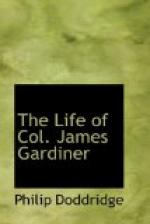“Now observe, sir, this seems to be a literal description of the place where this Christian hero ended his sorrows and conflicts, and from which he entered triumphantly into the joy of his Lord; for, after he fell in the battle, fighting gloriously for his king, and the cause of his God, his wounded body, while life was yet remaining, was carried from the field of battle by the east side of his own enclosure, till he came to the church-yard of Tranent, and was brought to the minister’s house, where, about an hour after, he breathed out his soul into the hands of his Lord, and was conducted to his presence, where there is fulness of joy, without any cloud or interruption, for ever.”
I well know that in dreams there are diverse vanities, and readily acknowledge that nothing certain could be inferred from this; yet it seems at least to show which way the imagination was working even in sleep; and I cannot think it unworthy of a wise and good man sometimes to reflect with complacency on any images which, passing through his mind even in that state, may tend either to express or to quicken his love to the great Saviour. Those eminently pious divines of the Church of England, Bishop Bull and Bishop Konn, do both intimate it as their opinion that it may be a part of the service of ministering angels to suggest devout dreams[1] and I know that the worthy person of whom I speak was well acquainted with that evening hymn of the latter of those excellent writers which has these lines:
“Lord lest the tempter me surprise,
Watch over thine own sacrifice!
All loose, all idle thoughts cast out;
And make my very dreams devout!”
Nor would it be difficult to produce other passages much to the same purpose,[2] if it would not be deemed too great a digression from our subject, and too laboured a vindication of a little incident of very small importance when compared with most of those which make up this narrative.[3]
[Footnote 1: Bishop Bull has these remarkable words: “Although I am no doater on dreams, yet I verily believe that some dreams are monitory, above the power of fancy, and impressed upon us by some superior intelligence. For of such dreams we have plain and undeniable instances in history, both sacred and profane, and in our own age and observation. Nor shall I so value the laughter of sceptics, and the scoffs of epicureans, as to be ashamed to profess that I myself have had some convincing experiments of such impressions.” Bishop Bull’s Sermons and Discourses, Vol. II, pp. 489, 490.]
[Footnote 2: If I mistake not, the same Bishop Konn is the author of a midnight hymn coinciding with these words:
“May my ethereal Guardian kindly
spread
His wings, and from the tempter screen
my head;
Grant of celestial light some passing
beams,
To bless my sleep, and sanctify my dreams!”
As he certainly was of these exactly parallel lines:




